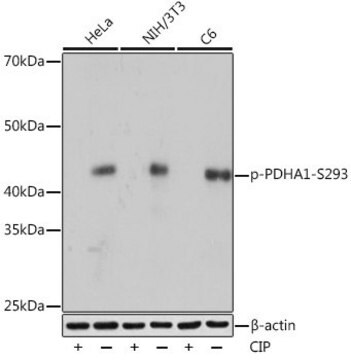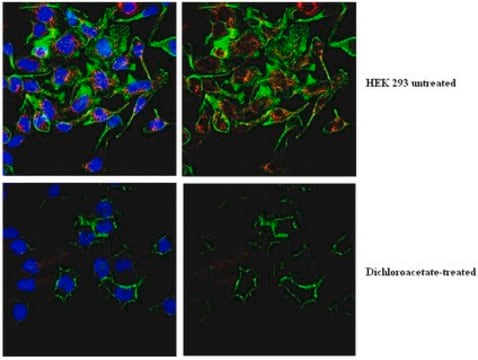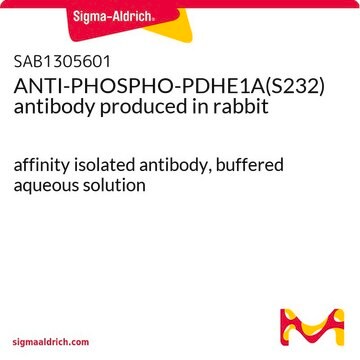ZRB1447
Anti-p-PDHA1-Ser232 Antibody, clone 2D5 ZooMAb® Rabbit Monoclonal

recombinant, expressed in HEK 293 cells
Sinónimos:
Pyruvate dehydrogenase E1 component subunit alpha somatic form mitochondrial;EC:1.2.4.1;PDHE1-A type I
Seleccione un Tamaño
192,00 €
Seleccione un Tamaño
About This Item
192,00 €
Productos recomendados
origen biológico
rabbit
Nivel de calidad
recombinante
expressed in HEK 293 cells
conjugado
unconjugated
forma del anticuerpo
purified antibody
tipo de anticuerpo
primary antibodies
clon
2D5, recombinant monoclonal
descripción
recombinant, expressed in HEK 293 cells
Línea del producto
ZooMAb® learn more
Formulario
lyophilized
mol peso
calculated mol wt 43.3 kDa
observed mol wt ~40 kDa
purificado por
using Protein A
reactividad de especies
human, mouse, rat
reactividad de especies (predicha por homología)
sheep, horse, bovine, monkey
envase
antibody small pack of 25 μL
características de los productos alternativos más sostenibles
Waste Prevention
Designing Safer Chemicals
Design for Energy Efficiency
Learn more about the Principles of Green Chemistry.
validación mejorada
recombinant expression
Learn more about Antibody Enhanced Validation
sustainability
Greener Alternative Product
técnicas
immunocytochemistry: suitable
immunohistochemistry: suitable
inhibition assay: suitable
western blot: suitable
isotipo
IgG
secuencia del epítopo
Internal
Nº de acceso Protein ID
Nº de acceso UniProt
categoría alternativa más sostenible
, Aligned
Condiciones de envío
ambient
temp. de almacenamiento
2-8°C
modificación del objetivo postraduccional
phosphorylation (pSer232)
Información sobre el gen
human ... PDHA1(5160)
Descripción general
Especificidad
Inmunógeno
Aplicación
Evaluated by Western Blotting in Rat liver tissue lysate.
Western Blotting Analysis (WB): A 1:1,000 dilution of this antibody detected PDHA1 phosphorylated on Ser 232 in Rat liver tissue lysate.
Tested applications
Immunohistochemistry (Paraffin) Analysis: A 1:1,000 dilution from a representative lot detected p-PDHA1-Ser232 in Human and Mouse liver tissue sections.
Peptide Inhibition Assay Analysis: Target band detection in Rat liver tissue lysate was prevented by preblocking of a representative lot with the immunogen phosphopeptide, but not the corresponding non-phosphopeptide.
Immunocytochemistry Analysis: A 1:100 dilution from a representative lot detected p-PDHA1-Ser232 in HepG2 cells.
Note: Actual optimal working dilutions must be determined by end user as specimens, and experimental conditions may vary with the end user
Evaluated by Western Blotting in Rat liver tissue lysate.
Western Blotting Analysis (WB): A 1:1,000 dilution of this antibody detected PDHA1 phosphorylated on Ser 232 in Rat liver tissue lysate.
Descripción de destino
Forma física
Reconstitución
Almacenamiento y estabilidad
Información legal
Cláusula de descargo de responsabilidad
¿No encuentra el producto adecuado?
Pruebe nuestro Herramienta de selección de productos.
Código de clase de almacenamiento
11 - Combustible Solids
Clase de riesgo para el agua (WGK)
WGK 1
Punto de inflamabilidad (°F)
Not applicable
Punto de inflamabilidad (°C)
Not applicable
Elija entre una de las versiones más recientes:
Certificados de análisis (COA)
¿No ve la versión correcta?
Si necesita una versión concreta, puede buscar un certificado específico por el número de lote.
¿Ya tiene este producto?
Encuentre la documentación para los productos que ha comprado recientemente en la Biblioteca de documentos.
Artículos
Learn about the hallmarks of cancer and find reliable ZooMAb® recombinant antibodies to study them, conveniently organized by cancer hallmark.
Filtros activos
Nuestro equipo de científicos tiene experiencia en todas las áreas de investigación: Ciencias de la vida, Ciencia de los materiales, Síntesis química, Cromatografía, Analítica y muchas otras.
Póngase en contacto con el Servicio técnico








